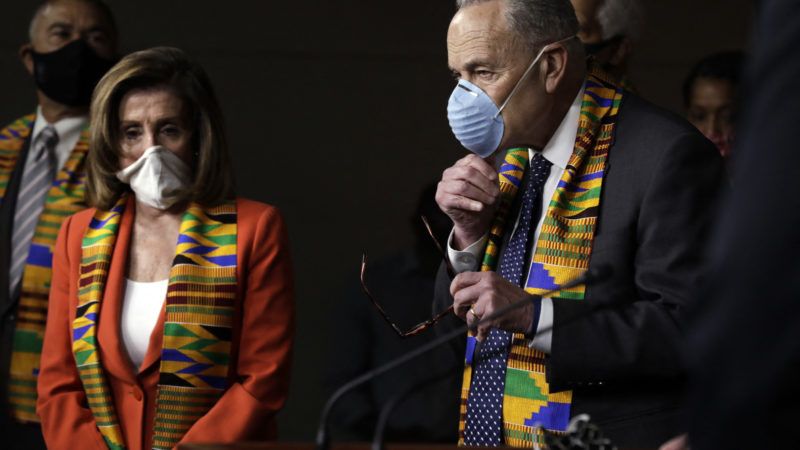Democrats Unveil Policing Reform Bill
The bill includes many items on police reformers' wishlists, but it would also pump more federal money to police departments instead of shrinking their budgets.

Congressional Democrats released wide-ranging police reform legislation today in response to the national outrage over last month's killing of George Floyd by a Minneapolis police officer.
The Justice in Policing Act would end qualified immunity, establish a national registry for police misconduct, ban police chokeholds and no-knock raids in some circumstances, and limit the transfer of military equipment to state and local police departments. It would also require federal law enforcement officers to wear body cameras and to have dashboard cameras installed in their vehicles.
"The martyrdom of George Floyd gave the American experience a moment of national anguish as we grieve for the black Americans killed by police brutality today," House Majority Leader Nancy Pelosi (D–Calif.) said at a Capitol Hill news conference today. "This moment of national anguish is being transformed into a movement of national action as Americans from across the country peacefully protest to demand an end to injustice."
The protests that erupted after Floyd's death have given sudden momentum to reforms that criminal justice activists have been trying to advance for years, such as opening up police disciplinary records and getting police out of schools.
Several of the measures in the bill, like curtailing no-knock police raids and qualified immunity—a legal doctrine that shields cops from liability in civil rights lawsuits—have been on libertarians' wish lists for a long time. But there are questions about just how much some of the bill's provisions could actually impact day-to-day policing. New York City, for example, banned police chokeholds, but that didn't stop officers from violating the policy or from largely escaping discipline when they did it.
And Congress has limited power to curtail police unions, one of the biggest impediments to bringing more transparency and accountability to police departments, because they are governed on the state and local levels by "law enforcement officers bills of rights" and collective bargaining agreements.
Civil liberties groups applauded some portions of the bill but criticized provisions that would increase federal funding for state and local law enforcement. The bill would authorize a $100 million grant program for state attorney generals to conduct investigations into systemic civil rights violations at police departments. Another provision authorizes a $750 million grant program for states to investigate and prosecute excessive force incidents.
Kanya Bennett, senior legislative counsel at the American Civil Liberties Union (ACLU), said in a press release that, while the bill "takes significant steps to protect people and ensure accountability against police violence," it "also provides hundreds of millions more to law enforcement, and for the ACLU, that's a nonstarter."
"While many of the reforms in this bill are laudable and vital, more must be done to change the role of police in our society fundamentally," Bennet continued. "There can be no more Band-Aid or temporary fixes when it comes to policing, which is why we are calling for divestment from law enforcement agencies and reinvestment into the Black and Brown communities that have been harmed by over policing and mass incarceration. The role of police has to be smaller, more circumscribed, and less funded with taxpayer dollars."
Several civil rights groups, including the Southern Poverty Law Center (SPLC) and the NAACP, put out statements saying that the bill isn't perfect but they still support it. Lisa Graybill, deputy legal director for criminal justice reform at SPLC Action, said the Justice in Policing Act "is an overdue step in the right direction."
The bill will face opposition from the right as well. White House press secretary Kayleigh McEnany said at a press conference today that ending qualified immunity was a "nonstarter" for the Trump administration.
"We should vote on each proposal separately," Rep. Justin Amash (L–Mich.), who introduced his own bill to end qualified immunity, tweeted. "Massive bills with dozens of topics aren't serious efforts to change law. They're messaging bills with no expectation of getting signed. They cram in so much that they're never written well or reviewed carefully."


Show Comments (113)